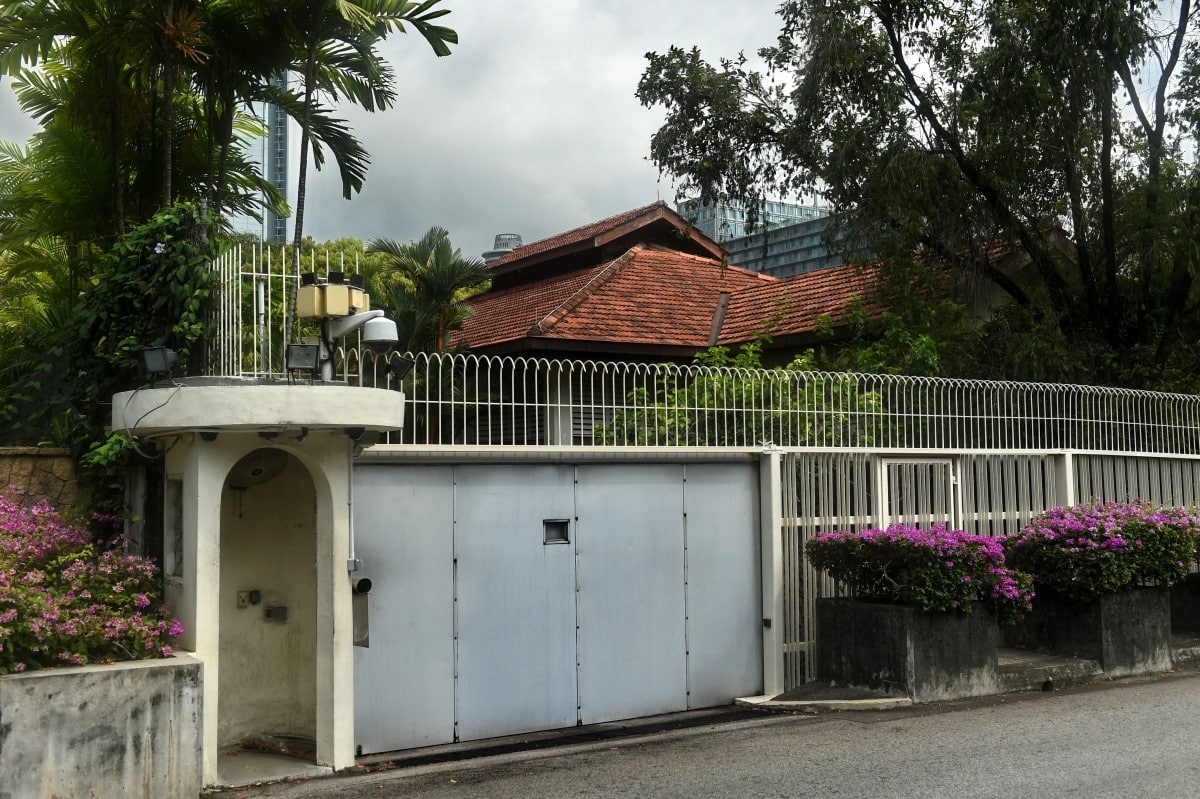Family feud reignites over Singapore ex-PM’s historic home

This general view shows the exterior of the house of Singapore’s late founding father Lee Kuan Yew at 38 Oxley Road in Singapore on April 11, 2016. FILE PHOTO/Agence France-Presse
SINGAPORE — A bungalow where Singapore’s early leaders spent long hours laying the country’s foundations is under the spotlight as a bitter feud rages between former prime minister Lee Kuan Yew’s children.
The row centers on whether to demolish or preserve 38 Oxley Road, the single-story house that hosted the formation of the People’s Action Party (PAP), which has governed Singapore since 1959.
The Lees are the closest thing Singapore has to royalty, with late patriarch Lee Kuan Yew, the country’s first prime minister, revered as its founding father.
READ: Singapore urges restraint as Lee mourners queue for 10 hours
His children’s disagreement over the house blew into the open in 2017, dividing the public as their feud generated headlines in international news.
Article continues after this advertisementThe thorny decision about the property’s future now falls on new Prime Minister Lawrence Wong’s government — six months after Lee Kuan Yew’s eldest son Lee Hsien Loong stepped down — as the country moves toward a general election next year.
Article continues after this advertisementLee Hsien Loong, who was prime minister for two decades, favours preserving the property, which property agents say has an indicative price of around Sg$30 million (US$23 million).
But his two siblings — corporate executive Lee Hsien Yang and the late neurologist Lee Wei Ling — have pointed to language in their father’s will calling for its demolition.
READ: Lee Kuan Yew: Who made him great?
The younger siblings accused their brother in 2017 of trying to exploit Lee Kuan Yew’s legacy for political gain, though the issue simmered down as Lee Wei Ling was still living on the property.
But her death on October 9 has left the house empty, reigniting calls from Lee Hsien Yang — who bought the property from his older brother in 2015 — for the will to be implemented.
“I am the sole legal owner of 38 Oxley Road. After my sister’s passing, I am the only living executor of my father Lee Kuan Yew’s estate,” the youngest sibling wrote on Facebook Tuesday.
“In his will, he wished for the house to be demolished ‘immediately after’ Wei Ling moved out of the house. It is my duty to carry out his wishes to the fullest extent of the law.”
Lee Hsien Yang, who has been living in self-exile since 2022, added he would apply to authorities to have the bungalow demolished and build a smaller residence.
Lee Wei Ling also left a note before her death saying: “Please honor my father by honoring his wish for his home to be demolished.”
‘Historical significance’
Built in what used to be a plantation district, the five-bedroom bungalow is now on prime real estate in land-scarce Singapore, where most of the population live in government-built highrise apartments.
The property was the home of founding premier Lee from the mid-1940s until his death. He is credited with transforming the former British colony into a wealthy city-state in just a little over 30 years.
Following the Lees’ public row in 2017, a ministerial committee — which included now-Prime Minister Wong — was tasked with looking at options for the bungalow.
It said in a 2018 report that the property had “architectural, heritage and historical significance”.
“The property was where meetings took place that led to the formation of the first independent government for Singapore, and altered the destiny of the country,” the committee said.
The house’s basement dining room was also where the PAP — still in power after more than 60 years — was formed in 1954.
The committee presented three options for the government on what to do with the property: preserve it as a national monument, retain the historic dining room and tear down the rest, and demolish the house for redevelopment.
‘Delicate matter’
“All eyes will be on how the government handles this delicate matter,” political analyst Eugene Tan told AFP.
Given that Wong was selected as Lee Hsien Loong’s heir-apparent in 2022, the new prime minister will have to demonstrate any decision about the land “was made without fear or favor”.
With a general poll to be held before November 2025, “it is an issue that the ruling party would rather not distract voters from their election manifesto”, said Tan, an associate professor of law at the Singapore Management University.
“(Wong) will seek to prevail in the court of public opinion by demonstrating how the decision was made, the considerations that applied, and how the decision is best for the country.”
Tan added that it was unlikely any decision would be made “in the foreseeable future”.
But Lee Hsien Yang said: “It has been nine years” since Lee Kuan Yew’s passing.
“That day (to demolish the house) is today,” he said.